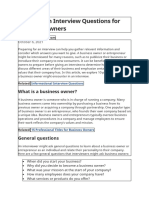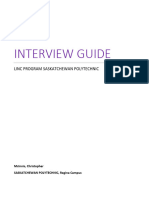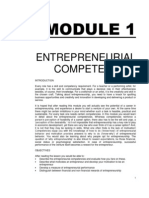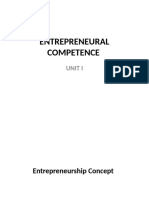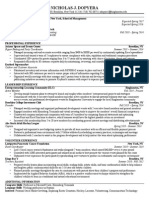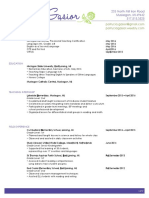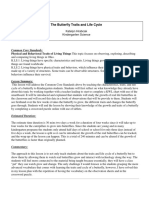Entrepreneur Interview: Assignment
Entrepreneur Interview: Assignment
Uploaded by
Kumar DharamdasaniCopyright:
Available Formats
Entrepreneur Interview: Assignment
Entrepreneur Interview: Assignment
Uploaded by
Kumar DharamdasaniOriginal Title
Copyright
Available Formats
Share this document
Did you find this document useful?
Is this content inappropriate?
Copyright:
Available Formats
Entrepreneur Interview: Assignment
Entrepreneur Interview: Assignment
Uploaded by
Kumar DharamdasaniCopyright:
Available Formats
Entrepreneur Interview
Assignment
Each student will interview an entrepreneur of his/her choice. The goal is to provide you with insights about entrepreneurship that cannot be obtained from classroom experience alone. Chose an entrepreneur in an industry that is personally interesting to you. While you may find it difficult to cold-call an entrepreneur, you will find that most entrepreneurs will be honored to be asked about their experiences and will be willing to meet with you. Entrepreneurs schedules are often tight, and your biggest challenge will be to find free time to meet them. Extensions will not be granted due to last minute scheduling. Each student will visit the company to meet the entrepreneur, observe how the venture operates. The company can be in any type of business, must be at least 3 years old, and employ 5 people. Written Assignment Write a 6-page 1.5 spaced paper that discusses what you have learned. Please make use of paragraph headings, sub headings and bullet points. (Total 100 points) Describes the entrepreneurs background, motivations for starting the venture, challenges in growing the venture. (~ 3 pages) (25 points) Evaluates the value proposition (target market, product/service description and unique benefit). (~ 2 pages) (25 points) Conclusion: what makes the company successful (or not)? What are your recommendations for improvement? (1 page) (25 points) Discuss how the findings of the interview apply or are meaningful to you. What have you learned about your own potential to be an entrepreneur? (1 page) (25 points) The objective is to drill down into the venture and thoroughly understand the entrepreneur and how he or she does business. It is critical that you do not just deal with superficial questions and answers. The key is to probe, to ask why, to delve beneath the surface. What insights can you offer about the persons career and your own entrepreneurial capabilities?
Tips Interview must be approached rigorously, not casually. Do not wait to set up an appointment. Entrepreneurs by definition are busy people and you need to fit into their schedule. The student should prepare questions in advance. It is helpful to first walk through the questions in a mock interview with a friend. 1
Entrepreneur Interview January 2006
The student should develop an efficient means for taking notes or capturing the key points made by the entrepreneur. The student should attempt to establish a personal rapport (taking the entrepreneur to lunch for the interview might help). Dont just dwell on the positive. Try to cut through the bias or propaganda. Be sure to examine the effect of the venture on the persons total life.
2
Entrepreneur Interview January 2006
Entrepreneur Interview Questionnaire Entrepreneur
Entrepreneur Before They Started the Venture What is the entrepreneurs educational background? What is the entrepreneurs previous work experience (before starting the venture)? Did the entrepreneur have any role models when growing up? Did the entrepreneur do entrepreneurial things as a youth? When did the entrepreneur know he/she wanted to be an entrepreneur? Did the entrepreneur have parents that were entrepreneurial? Entrepreneur at the Time He/She Started the Venture What was the entrepreneurs primary motivation for starting a business? What were the factors that led him/her to start the venture? What were the entrepreneurs goals at the time they started the venture? What sort of beliefs did the entrepreneur have (e.g., about employees, partners, debt, etc.)? Did the entrepreneur seek to establish a lifestyle business, a rapid growth business, or what? Did their growth orientation change over time? What sort of resources (not just financial) did the entrepreneur have when they started the venture? What sort of network did they have? Were there any especially creative things they did to come up with the needed resources? How concerned was the entrepreneur with control when starting the venture? Explore their need for control (of the venture, of people, of decision-making). What was the entrepreneurs risk orientation when they started the venture? Did the entrepreneur write a business plan? Did the entrepreneur feel prepared to start the venture at the time he/she started it? How long was a typical work day and work week when the entrepreneur first started the venture? Entrepreneur as She/He Grew the Venture How have the entrepreneurs goals & values changed since starting the venture? Did entrepreneurs risk orientation change as the venture grew? Did entrepreneurs need for control change as venture grew? Did the typical work week change as the venture grew (in terms of how much time the venture required and in terms of how the entrepreneur allocated his/her time)? Did entrepreneur make assumptions when they first started out that subsequently proved to be wrong? What sorts of insights were gained? 3
Entrepreneur Interview January 2006
What key mistakes did the entrepreneur make along the way? What were some of the key lessons learned? (ask about their greatest moment and their worst moment) Were there some critical points in the development of the venture when the venture almost failed, or when the entrepreneur found himself/herself at a critical crossroads in terms of some vital decision or issue that had to be addressed in a certain way or the venture would have failed? Entrepreneur Today and Tomorrow What would the entrepreneur do differently if they had it all to do over again? What key personal characteristics does the entrepreneur see in himself or herself that were especially critical for achieving success with this particular venture? What are the entrepreneurs plans for the future in terms of the venture? What is the entrepreneurs exit strategy or do they have one? What advice, based on his/her own experience, does the entrepreneur have for a student interested in starting a venture today?
Value Proposition
Product/Service What products and/or services are provided? What are the major features? Describe the environment (size, dcor and layout, etc.). Where is it located? How is the product/service produced and delivered? Collect copies of brochures, menus, price lists, advertising and promotion material Do your observations confirm the owners description? Target Market Who does the owner consider to be the target market? Why? o Demographics (gender, sex, age, race, education, occupation or profession, income, location, etc.) o Psychographics or life style (attitudes, beliefs, opinions, interests, values, etc.). o Social status: infers certain behavior (e.g. middle class values education, family activities, etc.) How are buying decisions made? Who makes the decision? Who influences the decision? Are buying decisions based primarily on price, quality, service, convenience, or other? How frequently is the product/service purchased? Do your observations confirm the owners description?
4
Entrepreneur Interview January 2006
Unique Benefits What does the owner consider the major benefits to the target market of the product/service? Why? How are these benefits unique? What company does the owner consider to be the major competitor? Do your observations confirm the owners description? References: These questions are based on work done by: Professor Jeffrey Timmons Babson College New Venture Creation, 5th edition Irwin McGraw Hill Professor Michael H. Morris, Ph.D. Witting Chair in Entrepreneurship Syracuse University
5
Entrepreneur Interview January 2006
You might also like
- 2023 UBS AC Prep MaterialDocument6 pages2023 UBS AC Prep MaterialNora PetruțaNo ratings yet
- ANDRAGOGY TM1 Module 1Document14 pagesANDRAGOGY TM1 Module 1Irish Joyce Mendoza Mariano100% (2)
- 10 Common Interview Questions For Business OwnersDocument6 pages10 Common Interview Questions For Business OwnersGede ArthaNo ratings yet
- How To Face Bank InterviewDocument74 pagesHow To Face Bank InterviewTushar PatilNo ratings yet
- Interview An Entrepreneur - Short-Term AssignmentDocument4 pagesInterview An Entrepreneur - Short-Term Assignmentsimrah zafarNo ratings yet
- Entrepreneur Profile1 1Document3 pagesEntrepreneur Profile1 1aishah91No ratings yet
- MGMT 212 - Business CommunicationDocument6 pagesMGMT 212 - Business Communicationsimrah zafarNo ratings yet
- Judge Sample Questions & FeedbackDocument2 pagesJudge Sample Questions & FeedbackDawit MekonnenNo ratings yet
- SHS EntrepDocument55 pagesSHS EntrepJhon mar MontunoNo ratings yet
- EMAct5Maglalang, Juan Miguel S.Document2 pagesEMAct5Maglalang, Juan Miguel S.Juan Miguel Salvador MaglalangNo ratings yet
- lec02Document4 pageslec02prithikavanipvNo ratings yet
- Entrepreneurship Guide Book: Entrepreneur Interview Questions and AnswersFrom EverandEntrepreneurship Guide Book: Entrepreneur Interview Questions and AnswersNo ratings yet
- Interview Tips - 1 PDFDocument6 pagesInterview Tips - 1 PDFDivyansh MittalNo ratings yet
- Getting Started With Beauty Care (Nail Care Services) : Prepared By: Cherrylyn T. Magano, LPTDocument16 pagesGetting Started With Beauty Care (Nail Care Services) : Prepared By: Cherrylyn T. Magano, LPTabc xyzNo ratings yet
- Aea 210Document61 pagesAea 210alfred asajileNo ratings yet
- Step 1: Know Yourself: The InterviewDocument4 pagesStep 1: Know Yourself: The Interviewjamshedpur_1No ratings yet
- Day 2Document69 pagesDay 2mamba.dedanNo ratings yet
- Startup FundmentalsDocument48 pagesStartup FundmentalsHuxaifa MoraNo ratings yet
- Entrepreneur InterviewDocument6 pagesEntrepreneur InterviewVerra Myza AratNo ratings yet
- Plan to Profit: How to Start and Grow A Successful Business of Your DreamsFrom EverandPlan to Profit: How to Start and Grow A Successful Business of Your DreamsNo ratings yet
- LINC Interview GuideDocument28 pagesLINC Interview GuideSherilyn TaoNo ratings yet
- Going For Interviews: First ImpressionsDocument5 pagesGoing For Interviews: First Impressionsसमंक मोहबेNo ratings yet
- How to Find a Million Dollar Business Idea: Actionable Guide to Coming Up With a Rock-Solid Business IdeaFrom EverandHow to Find a Million Dollar Business Idea: Actionable Guide to Coming Up With a Rock-Solid Business IdeaNo ratings yet
- Preparing Candidates For InterviewsDocument7 pagesPreparing Candidates For InterviewsMaddie_2No ratings yet
- Business Opportunities 2 ModulesDocument66 pagesBusiness Opportunities 2 ModulesPep1taNo ratings yet
- Entrepreneurship As A CareerDocument22 pagesEntrepreneurship As A CareerSumit DebnathNo ratings yet
- Acing The Interview PDFDocument7 pagesAcing The Interview PDFAamir Altaf0% (1)
- Preparation Kit 2023Document122 pagesPreparation Kit 2023kumbhare100% (1)
- Interview of An EntrepreneurDocument7 pagesInterview of An Entrepreneurhaseeb_tankiwala100% (1)
- Wharton Resume Advice EntrepreneurshipDocument2 pagesWharton Resume Advice EntrepreneurshipSumant MeherNo ratings yet
- Ed Notes (2023)Document74 pagesEd Notes (2023)Suraj BeheraNo ratings yet
- Chapter Two NewDocument52 pagesChapter Two NewKebede ChallaNo ratings yet
- Module 1Document14 pagesModule 1Jomarich Fernandez FelipeNo ratings yet
- Interview PreparationDocument8 pagesInterview PreparationHenok 'Hamushte' GheotomNo ratings yet
- Chapter 4 The Challenges of Starting A BusinessDocument6 pagesChapter 4 The Challenges of Starting A Businessali goharNo ratings yet
- Interview PreparationDocument16 pagesInterview Preparationjamshed90No ratings yet
- Interview of An EntrepreneurDocument5 pagesInterview of An EntrepreneurJp FreckNo ratings yet
- The Business Leaders Essential Guide to Growth: How to Grow your Business with confidence, control and reward.From EverandThe Business Leaders Essential Guide to Growth: How to Grow your Business with confidence, control and reward.No ratings yet
- Interviews PreparationDocument10 pagesInterviews PreparationPriyanka SahniNo ratings yet
- ESB Exam UpdatedDocument4 pagesESB Exam UpdatedJohn SmithNo ratings yet
- Business Success or FailureDocument5 pagesBusiness Success or FailureRay John DulapNo ratings yet
- Preparation Kit 2024 - IIM ShillongDocument129 pagesPreparation Kit 2024 - IIM ShillongBhagyashree MahajanNo ratings yet
- ED Unit - 1Document65 pagesED Unit - 1Saravanan.ANo ratings yet
- Marketing Yourself ExerciseDocument9 pagesMarketing Yourself ExerciseMuhammed Hashir AssanNo ratings yet
- Name: Reg No: Course Unit: Lecturer: Semester: YearDocument4 pagesName: Reg No: Course Unit: Lecturer: Semester: YearKitakaNo ratings yet
- Startups and InnovationDocument2 pagesStartups and InnovationUmut BozbıyıkNo ratings yet
- A Feasibility Study and YouDocument2 pagesA Feasibility Study and YouRaff SantosNo ratings yet
- ICT HandoutDocument12 pagesICT HandoutaweeNo ratings yet
- Annexure IDocument3 pagesAnnexure IArsal AliNo ratings yet
- Career PlaningDocument4 pagesCareer PlaningPrudvisai AnnangiNo ratings yet
- Interviewing SkillsDocument26 pagesInterviewing Skillsanishchattha194mNo ratings yet
- Lesson 4 Business Resources Ideasforan EntrepreneurDocument3 pagesLesson 4 Business Resources Ideasforan EntrepreneurShawn PeridoNo ratings yet
- Keep Your Job Secure: Strategies to Protect Your Job and Ensure Your Future EmploymentFrom EverandKeep Your Job Secure: Strategies to Protect Your Job and Ensure Your Future EmploymentNo ratings yet
- Preparing For Your InterviewDocument4 pagesPreparing For Your InterviewJamie RandolphNo ratings yet
- "Elevate Your Entrepreneurial Journey Unleashing the Power of Startup Success": BusinessFrom Everand"Elevate Your Entrepreneurial Journey Unleashing the Power of Startup Success": BusinessNo ratings yet
- Entrepreneurship DevelopmentDocument6 pagesEntrepreneurship DevelopmenthailayNo ratings yet
- Interview Techniques: What Are Your Strengths?Document10 pagesInterview Techniques: What Are Your Strengths?anon-419873No ratings yet
- InterviewDocument6 pagesInterviewvai27No ratings yet
- Language Learning Resources: What, Why, and HowDocument50 pagesLanguage Learning Resources: What, Why, and HowYamith J. Fandiño100% (1)
- Curriculum Vitae: Kaleeckal Sankaran AnujDocument3 pagesCurriculum Vitae: Kaleeckal Sankaran AnujanujksssNo ratings yet
- Teach English Now. Foundational PrincipalsDocument1 pageTeach English Now. Foundational PrincipalsKyaw MongNo ratings yet
- Outcomes-Based-Educaton: Basis For Enhanced Teacher Education CurriculumDocument12 pagesOutcomes-Based-Educaton: Basis For Enhanced Teacher Education CurriculumFroilan MorenoNo ratings yet
- Understand DivisionDocument69 pagesUnderstand Divisiontau24No ratings yet
- Editorial WritingDocument49 pagesEditorial WritingJohn Michael Aseneta75% (4)
- Zap The Gaps MemoDocument4 pagesZap The Gaps Memoapi-243045379No ratings yet
- McDougall-Nordstrom. Ma Ka Hana Ka Ike: Kaona As Rhetorical ActionDocument24 pagesMcDougall-Nordstrom. Ma Ka Hana Ka Ike: Kaona As Rhetorical ActionBrandy Nalani McDougallNo ratings yet
- Edited Nick Resume 2Document1 pageEdited Nick Resume 2api-271174441No ratings yet
- Online ClassesDocument2 pagesOnline ClassesJuan Esteban Gaviria QuevedoNo ratings yet
- Handbook 2.9Document85 pagesHandbook 2.9Abdul AzizNo ratings yet
- Digital Unit Plan TemplateDocument4 pagesDigital Unit Plan TemplatejoseNo ratings yet
- Reference Excerpts: Further Guidance For Developing ATL in The MYPDocument9 pagesReference Excerpts: Further Guidance For Developing ATL in The MYPRITA CHANDRANNo ratings yet
- Test 7Document2 pagesTest 7Thanh TâmNo ratings yet
- Alisha Bicknell ResumeDocument1 pageAlisha Bicknell ResumealishabicknellNo ratings yet
- Lesson Plan Chrome Music Lab RhythmDocument9 pagesLesson Plan Chrome Music Lab RhythmJohn WilkinsNo ratings yet
- Understanding Signature StrengthsDocument10 pagesUnderstanding Signature StrengthsAmanda Rafkin100% (2)
- 2014-2015 Stonewall Tell Es Student-Parent HandkDocument30 pages2014-2015 Stonewall Tell Es Student-Parent Handkapi-30526931No ratings yet
- Usenmez@bilkent - Edu.tr: Hilmi Öncül Rabia Üşenmez EA 404 (Sibel Uğurlubilek GZ-63 (Sibel@ctp - Bilkent.edu - TR)Document2 pagesUsenmez@bilkent - Edu.tr: Hilmi Öncül Rabia Üşenmez EA 404 (Sibel Uğurlubilek GZ-63 (Sibel@ctp - Bilkent.edu - TR)vonacoc49No ratings yet
- Gasior Resume CatholicDocument2 pagesGasior Resume Catholicapi-314515446No ratings yet
- ACC351Document2 pagesACC351Alice LizzyNo ratings yet
- Integer Lesson PlanDocument2 pagesInteger Lesson PlanWilliam BaileyNo ratings yet
- Capstone ResumeDocument1 pageCapstone Resumeapi-278585586No ratings yet
- Lesson Plan Format 27-1Document4 pagesLesson Plan Format 27-1Renu SekaranNo ratings yet
- Prof. Ed. 21 Worktext LEpisode 0.6Document6 pagesProf. Ed. 21 Worktext LEpisode 0.6Rezia Rose PagdilaoNo ratings yet
- Parents Orientation Minutes of The Meeting 2020-2021 MDLDocument3 pagesParents Orientation Minutes of The Meeting 2020-2021 MDLEDMAR POLVOROZA100% (19)
- Carroll Et Al 2008Document10 pagesCarroll Et Al 2008giordanoserenoNo ratings yet
- The Butterfly Traits and Life Cycle: Common Core StandardsDocument7 pagesThe Butterfly Traits and Life Cycle: Common Core StandardskatelynNo ratings yet
- Charles Darwin University ProspectusDocument18 pagesCharles Darwin University ProspectusCharles Darwin UniversityNo ratings yet


